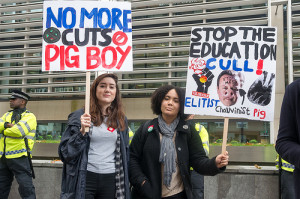UNDERSTANDING THE CONTEMPORARY HIGHER EDUCATION STUDENT
CALL FOR PAPERS FOR ONE-DAY SEMINAR
Wednesday, 21st September 2016, University of Surrey
Keynote speakers: Anna Mountford-Zimdars (King’s College London) and Michael Tomlinson (University of Southampton)
There is some evidence that, at least within countries with neo-liberal welfare regimes, students are constructed largely as consumers with contemporary policy texts. However, there is less consensus about whether or not students have taken up such an identity. Some scholars have assumed that this construction of student-as-consumer is having a profound effect on how students themselves approach HE. Indeed, Molesworth et al. (2009) contend that the inculcation of a consumer identity has brought about a more passive approach to learning, in which students place much more emphasis on their rights rather than their responsibilities, and on having a degree rather than being a learner. Others have, however, argued that, despite the increasing recourse to the language of economics in policy documents (in which students are positioned as consumers and universities as providers), in practice, the behaviour of students does not conform to this model (Dodds, 2011; Williams, 2013). Moreover, research has suggested that such identities may be differentiated by socio-economic characteristics, with only more affluent groups having the capacity to ‘shop around’, unencumbered by financial concerns or the ‘identity risks’ of moving away from home.
This one-day seminar will provide an opportunity to explore our current understandings of the contemporary higher education student, and the extent to which they are shaped by, for example, policymakers, the media, higher education staff and students themselves. Papers may focus on one or more of the following: the impact of tuition fees on understandings of what it means to be a student; students as consumers; media representations of students; students as political actors; policymakers’ understandings of students; and cross-national comparisons. However, other topics, relevant to the seminar theme, are also welcome.
Abstract Submission: Please send abstracts of up to 250 words by 13th May 2016 to Rachel Brooks at the University of Surrey: r.brooks@surrey.ac.uk. (There will be a small charge of £30 for attending the seminar.) You can book your place here.
Seminar Organisers: The seminar is organised by Rachel Brooks and colleagues in the Department of Sociology at the University of Surrey. It will help to launch the five-year EuroStudents research project based at Surrey, which investigates understandings of the higher education student across six different European countries.




 July will focus on the question of what ‘education for the future’ should look like.
July will focus on the question of what ‘education for the future’ should look like. issue of FORUM Journal invites written contributions which explore the idea of a socially just education system focusing on how such a system might address inequalities in society. The issue will explore alternative and innovative examples and ideas from schools and universities across a range of countries (including Denmark and the USA) and consider whether these alternatives may illuminate approaches to reducing social and educational inequality.
issue of FORUM Journal invites written contributions which explore the idea of a socially just education system focusing on how such a system might address inequalities in society. The issue will explore alternative and innovative examples and ideas from schools and universities across a range of countries (including Denmark and the USA) and consider whether these alternatives may illuminate approaches to reducing social and educational inequality. I have recently sent off the final manuscript for Student Politics and Protest: International Perspectives, which will be published in the
I have recently sent off the final manuscript for Student Politics and Protest: International Perspectives, which will be published in the